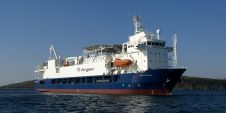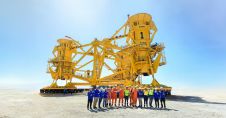The Public-private Dilemma
Interview with Dr Cees Laban, marine project developer, Business Unit Geology, TNO
Privatisation as an answer to the financial challenges of survival has become a trend among public organisations, and hydrography is no exception. Private enterprise, worried about ‘unfair competition’, often looks with suspicion upon this. How are public-knowledge institutions currently organised and operating? Dr Cees Laban of the Geological Survey of The Netherlands agreed to be interviewed about his own organisation. Please outline for our readers how you as a geologist became involved in hydrography.
From its inception, one of the main tasks of the Geological Survey of The Netherlands was mapping the subsoil of the Dutch land area. In 1968 there began oil and gas exploration in the Dutch part of the North Sea, and information about the geological conditions of the upper layers was needed, for instance for foundation purposes. In the meantime, large amounts of ‘infill’ sand were extracted from the North Sea bed for extension of Amsterdam’s industrial and harbour facilities. With this in mind, the director of the Survey decided that from then on mapping programmes should also include the Dutch sector of the North Sea. In close co-operation with the Hydrographic Office of the Royal Netherlands Navy and the Ministry of Transport, Public Works and Water Management, the first seismic and sampling programmes were carried out in 1968 and 1969. Since that time, the use of sea and seabed resources has grown enormously and the problems to be solved have become more and more complex. I started the marine geological investigations in 1968; since then my staff has grown to more than twenty marine scientists, including geophysicists, geologists, environmental and IT specialists.
You started your geological career in the former Geological Survey of The Netherlands (RGD), a Dutch public institution. Please describe the process of transition of the RGD into the present organisation of TNO.
On 1st September 1997,on the basis of a decree passed by the Dutch government, The Netherlands Institute of Applied Geosciences TNO – National Geological Survey was formed from two longstanding geoscientific institutions; it was ratified by the Lower House in October 1996. TNO became the central geoscientific information and research institute from which industry and governmental bodies could obtain customised geoscientific data, information and know-ledge. Several reorganisations followed over subsequent years, and currently the institute is part of TNO core area, Built Environment and Geosciences – Geological Survey of The Netherlands.
What are the current activities of the institute, and is TNO working for private customers? If so, how is this organised?
The institute has two main tasks. The first is an information function, which includes collecting and acquiring data and information on the subsurface of The Netherlands and its natural resources, checking quality, archiving, analysing, interpreting and disseminating it. This information is made available to end-users on the website www.dinoloket.nl. Secondly, there is a research function that includes conducting applied geoscientific and related technological research, complex geoscientific advisory work, making accessible and disseminating non-confidential geoscientific knowledge and other research results, linking university and applied geoscientific research and complex advisory work in an appropriate manner, and public-private co-operation.
The unit you are working in is called the Business Unit, suggesting that TNO is carrying out this function. What is your role in this concept?
TNO develops new applications together with customers keen on investing in innovation, and their return on that is a competitive knowledge edge. My role is marine project development, including complex geoscientific advisory projects for government and industry; EU-financed projects like in the Fp6 Framework, Interreg, World Bank projects, and government-financed research programmes like BSIK, PSO and PESP.
What kind of research do you offer private organisations?
Our Business Unit Geology has a unique combination of geo-expertise and data on regional and local conditions, such as the successions and properties of deltaic and other coastal-lowland sediments and the processes occurring on the surface and in the subsurface of both land and North Sea areas. Our expertise covers a wide range of disciplines. This allows advising industry and government on complex geoscientific matters; for instance by developing custom-made models of the subsoil at local or regional scale for both The Netherlands and other parts of the world, since most coastal lowlands in the world share similar physical subsurface characteristics. One recent example is Coastplan, a four-year project funded by the government of The Netherlands and aimed at promoting Integrated Coastal Zone Management and, more particularly, the contribution of geosciences to ICZM. Three selected themes were addressed here: Delta development (Yellow River Delta in China), Land Use Planning (Jakarta Bay Indonesia) and Geohazard mitigation (Lae area in Papua New Guinea). The project was implemented by TNO through the Co-ordinating Committee for Coastal and Offshore Geoscience Programmes in East and Southeast Asia (CCOP).
Private enterprises voice concern over the ‘unfair competition’ posed by your organisation carrying out commercial research. What is your view on this?
This is the ‘Public-Private dilemma’. Every now and then the hydrographic community comes to blows over an issue that may affect the existence of some commercial survey companies: ‘unfair’ competition from public or government bodies. Examples of this are the commercial activities of cadastres in overseas countries, the use of Hydrographic Offices for commercial purposes, and consultancy services offered by government organisations etc. TNO carries out high-end research on a real-cost basis.
When your organisation gives a quotation for work under paid contract, what is the basis for your price setting, competitive or based on real costs?
As I have already explained, TNO makes offers against real costs. Our competitive edge must, because of our expertise, come from significant added value; it is our expertise that becomes translated into either time efficiency or quality of end product.
Innovation is a keyword within many governmental organisations and private companies. Many private companies invest in innovation at high financial cost. As a knowledge organisation your innovations are (partly) public. Do you share your knowledge with the market and, if so, how?
The strength of TNO is that it makes innovation possible by translating scientific knowledge into practical applications across a whole range of fields. TNO holds a leading position in the international knowledge infrastructure and develops new know-ledge in collaboration with universities and leading institutes of technology. TNO also participates in a large number of projects within the R&D programmes of the European Union. This enables TNO to have constant access to the newest high-quality expertise for its customers.
What is your experience of competition in public projects? Do you think that being a knowledge organisation provides advantage or disadvantage in bidding contracts for projects tendered by the government?
Because of the fact that knowledge institutes work to the benefit of the government and the private sector, they have facilities and experienced personnel available to develop new innovative systems and methodologies. Furthermore, they have longstanding co-operative arrangements with knowledge institutes abroad, which often includes access to each other’s data and knowledge. This is an advantage for knowledge institutes when tendering for government projects.
What is the policy of TNO: does the organisation aim to be a commercial research facility (like Bell labs or Philips Natlab), a university or a consultancy company?
TNO does not want to be a commercial research facility. As outlined above, TNO is a knowledge institute that transfers and develops state-of-the-art knowledge in collaboration with universities and leading national and international insititutes of technology. Its participation in EU R&D programmes enables TNO to have constant access to the newest high-quality expertise for its customers.
Do you have a particular message for the hydrographic community?
TNO is involved in innovative research, including quantitative studies of the short- and long-term behaviour and dynamics of seabed processes and bed-forms. Knowledge of these processes and features can be of great help in planning offshore facilities and structures. When it comes to the hydrographic-survey and soil-investigation business, TNO can provide useful platforms from which to execute projects together with commercial survey companies. The professional authority of TNO, and its networks with sister organisations, government, universities, embassies etc. provide added value when conducting work for customers.

Value staying current with hydrography?
Stay on the map with our expertly curated newsletters.
We provide educational insights, industry updates, and inspiring stories from the world of hydrography to help you learn, grow, and navigate your field with confidence. Don't miss out - subscribe today and ensure you're always informed, educated, and inspired by the latest in hydrographic technology and research.
Choose your newsletter(s)
























